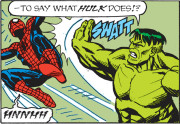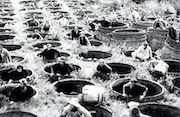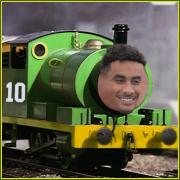|
Error 404 posted:The next movie had better have Karl Urban's McCoy chilling in his quarters smoking space weed and listening to dubstep. Or singing a song about a children's book.
|
|
|
|

|
| # ? May 9, 2024 22:19 |
|
1st AD posted:And The Voyage Home Here's hoping that when they get to a fourth one in this series it's like the end of Back to the Future II and Chris Pine and Zachary Quinto have to sneak through footage of the old movie after going back to 1986 to get their own whales. Or they just re-film it where they have to fistfight old Shatner for the whales.
|
|
|
|
ApexAftermath posted:Glad to hear it. I can't change my tickets to a 2D show now so I'm glad to see that others are not reporting the issues with the 3D that some have. Probably just comes down to personal taste. Frankly I have never gone to a 3D movie and had any of the issues that some of the naysayers are mentioning so I'm guessing this stuff just sticks out more to some people. Yeah, I'm one of those weird ones who likes a fair few 3D movies, even those that are post production conversions. I seem to be in the minority of people judging from the experiences I've read about online. For the record, the worst 3D I've ever seen was Clash of the Titans. The Hobbit in 3D at IMAX in Sydney had awful shuderring ghosting with any fast movement. More recently I felt Iron Man 3 in 3D added nothing.
|
|
|
|
Mr. Flunchy posted:I loved this - functioned as an exorcism of everything I don't like about Star Trek. I'm legitimately curious about your experience of Star Trek pre-Abrahms? As Next Generation has comparatively little of the laser-guns/fights stuff, and even the original is often more about the moral dilemma than action set-pieces. And DS9 covered the darker elements of what that kind of post-class, post-scarcity utopia costs when it's threatened from outside and within. I came away from the film thinking... It's a competently made action flick, with solid casting, much like the first, but honestly? I'm not confident Kurtzman and Orci know what the word redraft means. The script is AGGRESSIVELY dumb, from lazy cribbing from the previous films, without regard to whether it makes sense, through needless non-sequiturs down to mistakes that shouldn't have gotten past a proof reader (Someone makes reference to the Enterprise's "aft nacelle"- if you're not a big Trek fan, the nacelles are the cylindrical engine bits that hang off the back... which is what aft means, rendering the adjective pointless.) It's the same issue the first reboot installment had, in that it hopes by pacing everything at that breakneck speed you won't actually have time to think about how little sense the plot makes, nor how condescending the script is. The whole structure of Starfleet in both films just makes me angry when the dialogue addresses it, because it's done in terms that make it clear the writers see the audience as children who can't comprehend anything more complex than captain = boss, not-captain = bad. The theme they seemed to be setting up, the idea of Kirk being reckless and dodging culpability and responsibility just putters out because he doesn't actually do anything wrong bar the scene that leads into that theme. The rest of the plot, his bucking authority is always the RIGHT call. There's also a touch of something to do with militarism as you note, but the film gets so stuck in wanting to regurgitate past Trek success that it barely pays lip-service to it. There's no articulation of that theme, just that more guns is implicitly bad, almost as if they're afraid actually discussing it will either bore the audience or risk them not instantly siding with the Enterprise. Pine's better as Kirk this time, mostly because they cut back on his smugness-masquerading-as-cocky-bravado that the first one ran with. Quinto's still good as Spock, though they're going to the well of him emoting dramatically too often. Nimoy got a lot out of a little, and Quinto's capable of the same, sad that JJ doesn't trust him to do so. Zoe Saldana's fine, much as she always is, Urban's good, John Cho actually gets some fun stuff to play, and Cumberbatch doesn't do anything the trailers don't suggest, but he's good at the cold superiority thing, so Harrison's problems are in being under-written for what the story wants from him. The lens-flare is still distracting, but you know it's there going in, and the film's not shot badly, but not stunningly either. I don't want my money back, but I really hope this franchise gets into a different creative team's hands soon, because this current one does not get it at all.
|
|
|
|
Just back from seeing it. I enjoyed it for what it was: a souless Trek box-ticking, focus-grouped and safe exercise. Two moments pulled me out of the movie: 1) They are orbiting the moon, then suddenly they are orbiting Earth and plumetting towards it. The script literally gives no fucks about it's audience's power of perception. I can understand the thematic reasons for doing so, but just urgh!  2) We need Khan's blood. But let's ignore the fact that we have 72 other people on board with the same stuff. Let's not even try it. That said I enjoyed Uhura kicking arse, the visuals, Cumberbatch, Quinto, the little nods "here, put on this red shirt" and the fact that Micky from Doctor Who is getting acting hollywood acting work but that was about it. The rest was all pretty forgettable.
|
|
|
|
The film definitely had a strong theme about taking responsibility and what that actually means. I liked that the day was saved by Scotty resigning rather than breaking Starfleet regs and possibly risking the ship and crew. I won't go on about it til the main part of the thread have seen it but that scene pretty much encapsulated the wider story for me. As a film it was exactly as you'd expect, the plot felt disjointed for the first half, just a series of events that happened without a clear connection, but when it started coming together it starts dragging you along for the ride the same way the first film did and gets really good, Quinto and Cumberbatch especially are great. It's not the perfect ensemble piece the first was and a few of the crew didn't get enough time to shine but the character moments that are there still work well. One thing I really loved was how interesting the extras were on the Enterprise, there were robot dude Data-betas? and chromey-faced aliens and bald women and absurdly handsome redshirts and hipster haircuts, it was a nice touch that did a lot to remove the 'bridge crew and the rest of those nameless plebs' feel Star Trek can have.
|
|
|
|
Gaz-L posted:I'm legitimately curious about your experience of Star Trek pre-Abrahms? Alright. You're probably going to crucify me for this (and maybe rightly so), but I've seen First Contact, Insurrection and Nemesis and that's about it. Maybe the odd episode of Next Generation here and there, but I can't remember anything specific except for an episode where Worf turns into a spider monster and one where everyone turns into children. But I that was enough to put me off it (until Star Trek 09 anyway). There just seemed too big a gap between the liberal pacifist philosophy that makes up the moral core of the show and the fact that at the drop of a hat you get jumpsuited people running around with guns shooting monsters and firing missiles in space combat. Rather than a science mission it's more like a colonial space Navy, appropriately so given that the USS Enterprise is named after the first nuclear powered aircraft carrier. I get that conflict and battles are needed to make a TV show or film exciting, but even so this disconnect between message and material feels hypocritical. That's why I liked Into Darkness so much, it tackled this hypocrisy: a heavily armed gunship packed with uniformed, phaser wielding soldier/scientists off on some ill-defined 'science' mission. And what's important about Kirk being reckless and bucking authority is that this tendency is explicitly harnessed to use him to commit war crimes. His 'gut' feeling after Pike dies is to go on a roaring rampage of bloody revenge, a rebellion tacitly encouraged by Admiral Peter Weller. The assassination mission is presented by him as a way to kick back against clinical rules and regulations, which Kirk is bridling against at that moment because they nearly got Spock killed. The important character change comes when the Kirk the soldier decides that "just following orders" isn't a defence, even if the orders appeal to his rebellious nature. He realises he needs to start taking personal responsibility for his actions. Necrothatcher fucked around with this message at 23:13 on May 9, 2013 |
|
|
|
Mr. Flunchy posted:Alright. You're probably going to crucify me for this (and maybe rightly so), but I've seen First Contact, Insurrection and Nemesis and that's about it. Maybe the odd episode of Next Generation here and there, but I can't remember anything specific except for an episode where Worf turns into a spider monster and one where everyone turns into children.
|
|
|
|
Mr. Flunchy posted:Alright. You're probably going to crucify me for this (and maybe rightly so), but I've seen First Contact, Insurrection and Nemesis and that's about it. Maybe the odd episode of Next Generation here and there, but I can't remember anything specific except for an episode where Worf turns into a spider monster and one where everyone turns into children. Yeesh. The latter 2 TNG movies are considered the worst of the series, period. Especially Nemesis. And the two episodes you mention are pretty awful too. When people say these movies don't represent the TV show, they're referring to episodes like "Who Watches The Watchers" where Picard begins to be worshipped as a god by a Bronze Age culture, or "The Inner Light" where Picard relives the life of an alien, or "Darmok" where the real conflict is one of understanding between our heroes and another race who don't communicate in the same way. Until Deep Space 9's war arc, I can count on one hand the number of big battles I recall from the show, but I can think of a lot of great dialogue scenes and dilemmas. And that's one way of looking at it. I saw it as him bucking authority to do the right thing, he gets lectured... He follows sketchy orders and then he bucks authority to do the right thing... and it's the right thing. He has no arc. I don't think you can say it's rebellion when Weller's supposed to be Starfleet Chief of Staff or something. Compare to Wrath of Khan (which the writers of this one seem to both have studied endlessly and also never seen, given how mangled and soulless their references are) where the theme is Kirk getting older and running out of ways to cheat death... Which ends in Spock's sacrificing himself to save the ship. He runs out of luck, and learns that mortality is a reality you can't escape from, and that's tragic (Spock) and wonderful (he gets to connect with his and Carol's son). Hell, the use of Khan at all in this one is awful, because it's using the name without realising that WoK works because it's personal. Khan blames Kirk for his wife's death, whether or not he could've prevented it. In this one? The grudge is against Weller... I'm glad you're enjoying this reboot, my question was genuine though, and I think you've misjudged the prior life of the franchise based on it's worst examples, First Contact notwithstanding (and even that requires context to truly make sense, though I think the Moby Dick parallel does enough to have it play well, and Picard's journey in that film is abandoning blind vengeance against a foe that in all meaningful ways raped him, and not letting that experience define him. The Picard he returns to in the culmination of that plotline is the 'real' Picard, the calm, diplomatic intellectual.
|
|
|
|
Hey can someone tell me if Khan here ever starts acting like himself? As in his mannerisms, way of speaking, unbridled passion, etc.? Just cause, going by the trailers, he doesn't remind me of Khan at all aside from being evil and strong. My inner geek would be pretty irritated if after 30 years of dormancy they brought him back just to be a Khan-in-name-only. Note that I know nothing of the spoilers except for the villain indeed being Khan.
|
|
|
|
Teron D Amun posted:Khan and the other genetically enhanced humans had been created long before Starfleet existed, wasn't mentioned in this movie but rather in TOS / Star Trek 2 Oh I know, there aren't even any augments around anymore, barring the odd Bashere here and there. Was it stated in Space Seed or Wrath of Khan that Khan was different from the other augments (he's their leader for a reason after all), or have I just did that thing I sometimes do where I make up plausible work arounds for plot holes and then just assume that they were in the actual movie itself.
|
|
|
|
Gaz-L posted:And that's one way of looking at it. I saw it as him bucking authority to do the right thing, he gets lectured... He follows sketchy orders and then he bucks authority to do the right thing... and it's the right thing. He has no arc. I don't think you can say it's rebellion when Weller's supposed to be Starfleet Chief of Staff or something. Compare to Wrath of Khan (which the writers of this one seem to both have studied endlessly and also never seen, given how mangled and soulless their references are) where the theme is Kirk getting older and running out of ways to cheat death... Which ends in Spock's sacrificing himself to save the ship. He runs out of luck, and learns that mortality is a reality you can't escape from, and that's tragic (Spock) and wonderful (he gets to connect with his and Carol's son). Hell, the use of Khan at all in this one is awful, because it's using the name without realising that WoK works because it's personal. Khan blames Kirk for his wife's death, whether or not he could've prevented it. In this one? The grudge is against Weller... I actually figured I'd probably seen the worst of Star Trek, but then so much of the iconography of the show permeates pop culture that it's pretty easy to get a handle on without actually sitting down with a Next Generation boxset and plowing through multiple hours of episodes. But anyway, re Kirk's arc: The assassination mission is presented as a rebellious conspiracy between Kirk and Admiral Robocop. In the Captain's meeting scene just before the Admiral subtly replaces Pike as Kirk's moral arbiter by allowing him to speak freely when Pike shushes him. A big part of Pine's Kirk is that he's searching for a new father figure which the the Admiral recognises and manipulates to his own end. In giving him this secret mission he's quite rightly figured out how to exploit Kirk's ego. He knows Kirk will go with his gut feeling and execute Harrison - and he's right - Kirk acting alone would have happily fired those torpedoes, all the while convinced he was doing the right thing. Kirk is very proud of his emotional/hot blooded nature, but his arc concludes when he consciously represses it, makes a logical decision and sacrifices himself. But, most importantly, he makes the same decision Spock makes in the opening sequence, a decision he couldn't begin to comprehend just 2 hours of screentime ago. Now that's good character development dammit.
|
|
|
|
I want to see this in IMAX but it's only playing in IMAX 3D. It sounds like the complaints about the 3D for this one aren't the usual "it's useless" sort but the " DON'T SEE IT IN 3D IT'S A TERRIBLE EYE-HURTING HACKJOB DON'T SEE IT IN 3D IT'S A TERRIBLE EYE-HURTING HACKJOB  " type. Is it worth skipping out on IMAX? " type. Is it worth skipping out on IMAX?
|
|
|
|
MajorB posted:I want to see this in IMAX but it's only playing in IMAX 3D. It sounds like the complaints about the 3D for this one aren't the usual "it's useless" sort but the " Seeing it in 3D wasn't the worst torture ever, but there definite moments where the 3D effect obviously isn't working very well, largely due to the way things are shot. There's a lot of quick panning in the bridge scenes that look terribly jerky as well. But it's not enough to ruin the film, if you see it in 3D it's not the end of the world.
|
|
|
|
MajorB posted:I want to see this in IMAX but it's only playing in IMAX 3D. It sounds like the complaints about the 3D for this one aren't the usual "it's useless" sort but the " The complaints here have been even mix so far between people who says it's the worst thing ever and beat up their grandmother, to people saying its fine. I think it's going to come down to if you have a beef with 3D to begin with. If you don't mind 3D then you will probably be fine with this just going by what reactions are.
|
|
|
|
Mr. Flunchy posted:I actually figured I'd probably seen the worst of Star Trek, but then so much of the iconography of the show permeates pop culture that it's pretty easy to get a handle on without actually sitting down with a Next Generation boxset and plowing through multiple hours of episodes. Agree to disagree. I never thought Kirk was beyond self-sacrifice, just that he was a "leave no man behind" type. The dilemma in the opening isn't the danger, it's in rescuing Spock despite the Prime Directive (also, a Star Trek captain ignores the Directive? I'm shocked, shocked, sir!) Spock's the one that goes through some kind of shift, from believing such a sacrifice is necessary, to baying for Khan's blood. I suppose it may also be partly baggage for me, in that I have a concept of who Jim Kirk is, so him behaving the way I'd expect isn't surprising, but I don't feel the movie gave me any reason to believe otherwise. It's not like Scotty's yelling at him to let them rescue him and he refuses. If he knew Khan's blood would work, he'd have asked Bones to do it himself. I think it comes back to the script for me. It worked for you, but I felt the writers had both a laundry list of set-pieces and a vague notion of how stories work... and they... kind of put the right stuff in, but it's not in the right order, or it's in backwards. So pat on the head, nice try sluggers, I'd say better luck next time, but they've had like 6 bites of the cherry now, including Transformers, and they're not getting better. I'd suggest at least grabbing season 3 of TNG if you can find it cheap or rent it from LoveFilm or somewhere. There's very little fat in that season, and some of the best of the series, as the writing staff solidified and found the show's voice. lizardman posted:Hey can someone tell me if Khan here ever starts acting like himself? As in his mannerisms, way of speaking, unbridled passion, etc.? Just cause, going by the trailers, he doesn't remind me of Khan at all aside from being evil and strong. My inner geek would be pretty irritated if after 30 years of dormancy they brought him back just to be a Khan-in-name-only. Note that I know nothing of the spoilers except for the villain indeed being Khan. Eh... a little. But not much, I'm afraid. Gaz-L fucked around with this message at 00:19 on May 10, 2013 |
|
|
|
Mr. Flunchy posted:Kirk is very proud of his emotional/hot blooded nature, but his arc concludes when he consciously represses it, makes a logical decision and sacrifices himself. But, most importantly, he makes the same decision Spock makes in the opening sequence, a decision he couldn't begin to comprehend just 2 hours of screentime ago. Now that's good character development dammit. I interpreted that completely differently, that Kirk was putting his crew before himself and that's it, and that Pikes accusation in the beginning that Kirk never losing a crew member was arrogant dumb luck wasn't actually true at all, it happened because Kirk seriously just cared. It wasn't logical and wasn't what Starfleet wants from a captain but was still the right thing to do. The point for me was that some orders are good and some are bad, and when you have people under your command you have to know the difference. The Enterprise being trusted to begin their five year mission was the culmination of that, it was Starfleet giving the crew autonomy because they earned it.
|
|
|
|
Mr. Flunchy posted:Alright. You're probably going to crucify me for this (and maybe rightly so), but I've seen First Contact, Insurrection and Nemesis and that's about it. Maybe the odd episode of Next Generation here and there, but I can't remember anything specific except for an episode where Worf turns into a spider monster and one where everyone turns into children. As someone who grew up watching TNG, DS9 and have a decent familiarity with the original, I thought that your criticism was spot on. The entire premise of the show (the final frontier) is inherently colonialism wrapped in liberal humanism. This was a core part of the show since the original series, featuring such adventures as Kirk arming a native population to wage a proxy war. Trek 09' was a fantastic response to the franchise and your essay has me even more interested in the sequel.
|
|
|
|
Danger posted:As someone who grew up watching TNG, DS9 and have a decent familiarity with the original, I thought that your criticism was spot on. The entire premise of the show (the final frontier) is inherently colonialism wrapped in liberal humanism. This was a core part of the show since the original series, featuring such adventures as Kirk arming a native population to wage a proxy war. Trek 09' was a fantastic response to the franchise and your essay has me even more interested in the sequel. Again, super glad people are enjoying these movies, because hey, they're kind of enjoyable spectacles, and something that provides fun and joy is good. But I'm legitimately stunned that people are able to get this kind of reading from the reboot. I have a hard enough time getting past the feeling that I'm being talked down to by the film that I can't even fathom there being any cogent critique of the franchise (and that sounds bad, I know, but it's honest). Granted, I've never found the flaws inherent in the Wild-West-in-space/Hornblower-in-space to be as disturbing or crippling as you and Mr Flunchy seem to, but perhaps that very audience is the one these films are aiming for?
|
|
|
|
Gaz-L posted:Again, super glad people are enjoying these movies, because hey, they're kind of enjoyable spectacles, and something that provides fun and joy is good. But I'm legitimately stunned that people are able to get this kind of reading from the reboot. I have a hard enough time getting past the feeling that I'm being talked down to by the film that I can't even fathom there being any cogent critique of the franchise (and that sounds bad, I know, but it's honest). Granted, I've never found the flaws inherent in the Wild-West-in-space/Hornblower-in-space to be as disturbing or crippling as you and Mr Flunchy seem to, but perhaps that very audience is the one these films are aiming for? I haven't seen the new film yet, but it sounds like these messages are coming more from Into Darkness and Trek 09's contribution only really make sense in hindsight. The first film is less about Starfleet specifically but more about the characters of Kirk and Spock, and of course the personification of the Trek nerd in Nero.
|
|
|
|
computer parts posted:I haven't seen the new film yet, but it sounds like these messages are coming more from Into Darkness and Trek 09's contribution only really make sense in hindsight. The first film is less about Starfleet specifically but more about the characters of Kirk and Spock, and of course the personification of the Trek nerd in Nero. OK, gonna need a bit more than that, because... what?
|
|
|
|
Mr. Flunchy posted:Alright. You're probably going to crucify me for this (and maybe rightly so), but I've seen First Contact, Insurrection and Nemesis and that's about it. Maybe the odd episode of Next Generation here and there, but I can't remember anything specific except for an episode where Worf turns into a spider monster and one where everyone turns into children. Star Trek DS9 dealt with a lot of those themes earlier, and quite well. Especially the pervasive casual racism in Starfleet (in the sense that the characters tend to define everyone by their race, and treat other species as monolithic groups).
|
|
|
|
Gaz-L posted:OK, gonna need a bit more than that, because... what? I'll quote this, it explains pretty well (and elaborates on the reboot's themes in general): api call girl posted:Not being a serious "hardcore" Trekkie or anything, and only going by what's been posted in this thread and that linked imdb spoiler review, let me try to piece together some coherent ramblings on the Star Trek reboot:
|
|
|
|
Regarding IMAX 3D, and I don't know if it was just my theater, but this was the first time I've ever experienced crosstalk in a 3D movie. If you're familiar with the Nintendo 3DS, there's an issue where the image of the opposite eye comes in a little on either side, so there's always some ghosting. It's especially perceptible in dark areas, which is obviously a lot of this movie. It's never been a problem at the movies. Usually if you close one eye you can get a perfect ghosting free 2D image. Not sure what the problem was here.
|
|
|
|
OK, I can see the reasoning there, though I greatly disagree with painting DS9 with such a negative brush, and largely disagree that it's possible to do that kind of revamp with something as all-sizzle as these films are. If anything, ID is crippled by it's insistence on drawing from what came before, not actually taking the premise of Trek and doing something new and modern with it. And Section 31 is barely more than a namedrop, the version in the movie bears little relation to the one in the shows. ID is SO obsessed with re-doing Wrath of Khan in some kind of 'destiny' (or just because it's 'expected') that the plot has to jump through a poo poo-ton of hoops while ignoring the personal and character motivations that made that plot compelling in the first place. It's a nice thought in some ways, although again, I love DS9 and think it's more an examination of the price of paradise. Voyager's really the stagnation point, because no more risks, no new ideas were being explored. TNG was deliberately different from TOS and DS9 was different from both, Voyager was a rehash, and to begin with so was Enterprise. And honestly, I feel a similar away about both JJ movies. There's a lot of flash and style that they hope distracts from there not being much there, and what is there is like a blurry Xerox of what used to work. I keep restating this point, I know, but I WANT to like these films, I want a bigger audience for this world. I just don't think jettisoning what makes it interesting in favour of shallow action romps is worth it (not to mention it's what almost killed the series the first time.)
|
|
|
|
DS9 was much more martial in tone than TNG, and while the military episodes were a fun change of pace on TNG, the best episodes were always the personal stories, or the ones about coming to understanding with new peoples, or just space wackiness. So I guess I disagree with Danger and Mr. Flunchy about the fascist overtones of TNG at least. The movies were all terrible though.
|
|
|
|
I never claimed it was fascist, at least not in a general sense; I don't think I have the memory to comment on individual episodes at the moment.
|
|
|
|
Gaz-L posted:OK, I can see the reasoning there, though I greatly disagree with painting DS9 with such a negative brush, and largely disagree that it's possible to do that kind of revamp with something as all-sizzle as these films are. If anything, ID is crippled by it's insistence on drawing from what came before, not actually taking the premise of Trek and doing something new and modern with it. And Section 31 is barely more than a namedrop, the version in the movie bears little relation to the one in the shows. ID is SO obsessed with re-doing Wrath of Khan in some kind of 'destiny' (or just because it's 'expected') that the plot has to jump through a poo poo-ton of hoops while ignoring the personal and character motivations that made that plot compelling in the first place. I don't understand what is "all-sizzle" or "shallow", but I think those are really meaningless ways to discuss a work of art in any medium. I assume you mean that the film is very distinct visually in some way? Feels somehow kinetic? I can only comment on Trek '09 at the moment, but the visual storytelling was a primary aspect of the story (it's a film, of course) and much of it's meaning is conveyed visually (the flares of light as halo, the overdesigned interiors, the sharp gritty design of Nero's ship...) edit: Meaningless in the sense that 'shallow" supposes that it didn't attain some required 'depth', which adheres to this really fallacious high/low art dichotomy. Danger fucked around with this message at 03:55 on May 10, 2013 |
|
|
|
The primary audience for "Star Trek" used to be Americans. With this new franchise, the series is being deliberately aimed at foreign markets which, for whatever reason, respond more to lasers going pew-pew than to people going yakity-yack. In fact, there's all sorts of foreign market considerations that have impacted the casting of this recent film. For example, the actor who plays the villain got the role because Hollywood really wanted to capture the British box office, which is also why the film premiered there. http://www.thewrap.com/movies/article/star-trek-darkness-heading-where-no-trek-has-gone-foreign-profitablity-89981
|
|
|
|
So, were they trying to capture the Australian audience with the last villain?
|
|
|
|
The comic book nerd in me can buy into the earlier stuff about rejecting gritty stuff. You've got a comic book character. Then the 90s hits, and that comic book character now has to be a grimdark angsty anti-hero, because that's what's expected. Time passes and eventually people wake up from that Grim Bender. Writers start returning that comic book character to its original, proper form. But what if you were a fan of that 90s-era comic book character? A restoration is objectively a rejection of what you liked. DS9 is far grittier than the rest of Trek, so any rejection of its contribution to the franchise is seen as a form of betrayal to its fans. But in a broad sense, the amount of people who feel betrayed are dwarfed by the amount of people that feel better about the franchise because the Unwanted Difference is being removed or reduced in weight.
|
|
|
|
Danger posted:I don't understand what is "all-sizzle" or "shallow", but I think those are really meaningless ways to discuss a work of art in any medium. I assume you mean that the film is very distinct visually in some way? Feels somehow kinetic? I can only comment on Trek '09 at the moment, but the visual storytelling was a primary aspect of the story (it's a film, of course) and much of it's meaning is conveyed visually (the flares of light as halo, the overdesigned interiors, the sharp gritty design of Nero's ship...) Star Trek's fanbase has traditionally been gathered vis-a-vis the television shows which feature extremely budget-constrained costuming, set design, and cinematography, so when Star Trek fans complain that a film is shallow they usually mean that the plot is shallow because they generally look at only plot, characterization, and acting as important hallmarks of good filmmaking. edit: and the Star Trek films have typically shared the same kind of cheapness in production design. I believe starting with Star Trek II the TV division of Paramount handled the production of the movies? Somebody like Aatrek is gonna know more about this. 1st AD fucked around with this message at 04:02 on May 10, 2013 |
|
|
|
Teenage Fansub posted:So, were they trying to capture the Australian audience with the last villain? Eric Bana was already a lower tier A lister in Hollywood and has been for a decade. Benedict Cumberbatch is almost entirely unknown in the U.S. I have seen couple of episodes of Sherlock and do think he's a capable actor, but, as the article I linked claims, there's the strong chance that the role went to him because of foreign box office considerations. No one in America is excited about Benedict Cumberbatch.
|
|
|
|
forever gold posted:No one in America is excited about Benedict Cumberbatch. I dunno about that, a huge chunk of my friend-group is super excited to see Cumberbatch on the big screen and we're all Americans.
|
|
|
|
forever gold posted:Eric Bana was already a lower tier A lister in Hollywood and has been for a decade. Benedict Cumberbatch is almost entirely unknown in the U.S. I have seen couple of episodes of Sherlock and do think he's a capable actor, but, as the article I linked claims, there's the strong chance that the role went to him because of foreign box office considerations. No one in America is excited about Benedict Cumberbatch. I'm excited for Cummerbatch, but I watch a lot of BBC stuff so I'm probably not the norm.
|
|
|
|
Pops Mgee posted:I'm excited for Cummerbatch, but I watch a lot of BBC stuff so I'm probably not the norm. It's fair to say there's a market for people who have seen BBC material (which is primarily young people) but that it won't capture an older demographic or one which isn't interested in outside media that much.
|
|
|
|
DS9 was "grittier and darker" but it also told a drat good, interesting story rather than being dark and gritty for its own sake. Voyager (which was sadly more popular than DS9 from memory) marked the point where the franchise ran out of ideas.... or rather, was afraid to implement them. Ronald Moore's Battlestar Galactica includes a lot of themes he had expected/hoped to have in Voyager which weren't possible because they wanted easily syndicated standalone episodes. Into Darkness' strength in my mind isn't necessarily that it rejects grim 'n' grittyTM but that tells an engaging story and uses the rejection of going "into darkness" as the key theme - the brighter, more optimistic exploratory nature of Starfleet isn't intrinsically superior to an examination of the lengths a culture will go to in order to preserve its high standard of living. Both takes on the series can be engrossing if the story/characters are there to back it up, and this is what ST:ID does well in my opinion. It gives the characters a choice to make and shows the anguish and difficulty of making it.
|
|
|
|
computer parts posted:It's fair to say there's a market for people who have seen BBC material (which is primarily young people) but that it won't capture an older demographic or one which isn't interested in outside media that much. My Dad doesn't know Cumberbatch by name, but he's liked what he's seen of Harrison in the trailers so far.
|
|
|
|
This is almost a question for the other thread, but couldn't a case be made that since since TOS, TNG and VOY were comparatively non-grim, DS9 being much more gritty would inherently be seen as being different for difference's sake, rather than something actively clamored for?
|
|
|
|

|
| # ? May 9, 2024 22:19 |
|
DS9 was gritty because they could get away with it on that show. For years guys like Ira Behr and Ron Moore had ideas shot down by Berman because they didn't meet his narrow vision of what Star Trek should be, so when Berman became occupied with trying to make Voyager the flagship show on a new network the DS9 writers basically were free to do whatever they wanted. Hell they even lied to Berman about the Dominion War lasting only 6 episodes or something and he was obviously too occupied to notice or do anything about it.
|
|
|


























